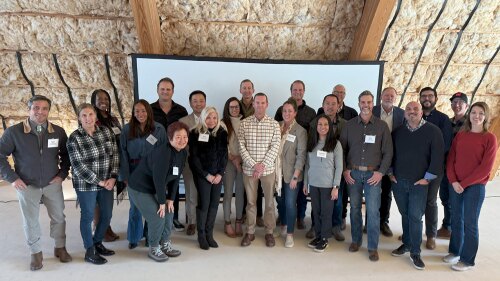The Affordable Housing Game—a new initiative from ULI Europe and the city gaming company Play the City—brings ULI members and partners together to develop innovative and collaborative approaches to increase a city’s supply of affordable housing. The Affordable Housing Game is a fast-paced, multiplayer strategy game in which players compete to develop proposals for affordable housing projects that will address areas of identified housing need in their city. The game is designed to be played by stakeholders who are involved in affordable housing policy and development.
In 2017, ULI Europe members played the game three times—twice in Dublin and once in Amsterdam. Both cities have recently introduced ambitious new housing policy agendas designed to increase homebuilding, and the central question for both games was how to create the right tools to achieve their ambitious targets.
In both cities, game play centered on an eight-square-meter (86 sq ft) game board containing a detailed land use map of the city and the location of potential development sites. Sites are real parcels that the government in each city had identified as potential locations for affordable housing development. Corresponding site passport cards contain information on the size of the site, land costs, density, and amount of social housing in the surrounding area.
In the game, each player is assigned a role, such as developer, investor, or policy maker. Players can be given roles that differ from what they do in their everyday jobs, to challenge them to take a different perspective. In the early rounds of play, players select sites and pitch potential projects to each other before voting on which projects should remain in the game. Players then form teams and further develop their proposals.
Players use a variety of game materials that are designed to inspire them to consider ideas and examples from cities around the world. More than 100 real affordable housing policies and programs, drawn from cities around the world, are summarized on strategy cards that are available throughout the game. From these, players select the strategies, such as regulations, subsidies, and incentives, that they will need to make their project viable. Players also select the type of housing they would like to produce from a group of 3-D printed models of real affordable housing projects.
The affordable housing game offers an opportunity to discuss an often-contentious topic in an open way with practitioners from a variety of sectors. According to John Bruder, chair of ULI Ireland, “It’s a very unusual thing for these people to discuss these issues in a nonconfrontational way where people leave their commercial agendas at the door and are prepared to lower their guard and play a game.” Future games will continue to work with ULI members in cities around Europe to develop practical solutions to the challenge of providing affordable housing.





